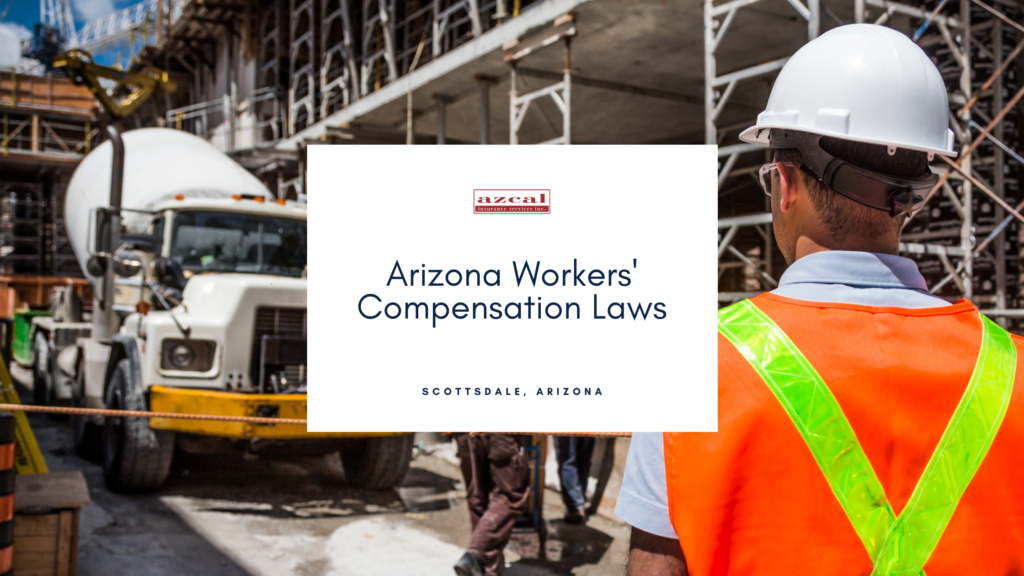Everything You Need to Know About Arizona Workers’ Compensation Laws

If you own a business in Arizona, it’s important for you to understand the state’s laws regarding workers’ compensation. Workers’ compensation is insurance coverage that a business provides to its employees in the event of a job-related illness or injury. Learn more about situations where workers’ compensation might be needed by contacting an agent at AZCAL Insurance Services.
Arizona Workers’ Compensation Requirements
Are you a business owner? Do you employ one or more people? Continue reading for information related to Arizona’s workers’ compensation laws. From the specific requirements to penalties to settlements, we’re here to fill in the details about workers’ comp.
Do All Businesses Need Workers’ Compensation in Arizona?
In Arizona, if a business employs one or more people, then it must carry workers’ compensation insurance. Coverage is required for both part-time and full-time employees. While this is the rule, there are a few exemptions worth noting. Workers’ compensation coverage is not necessary for the following groups:
- Independent contractors
- Sole proprietors
- Casual/occasional workers
- Domestic workers (those employed in a home)
For further clarification, we’ll elaborate on a couple of these groups.
Independent Contractors
Again, workers’ compensation is not required for independent contractors. However, to avoid any employee classification disputes, a business should ensure that their worker qualifies as a contractor and not an employee. Several factors to consider include:
- Employment duration
- Payment method
- Right to hire/fire
- How much oversight the employer has over the work
- Who supplies the tools/materials
- Work hours
- If the work is performed in the regular course of business
Sole Proprietors
If someone is self-employed and is the sole proprietor in the business, then workers’ compensation is not mandated. However, sole proprietors still have the option to carry workers’ compensation for themselves. In some cases, it is strategic for a sole proprietor to have coverage to help keep the business afloat in case the business owner is unable to work immediately after a job-related illness or injury.
What Does a Workers’ Compensation Policy Cover?
If an employee suffers a work-related illness or injury, workers’ compensation will cover the costs associated with it. More specifically, workers’ comp will help with the following:
- Medical care for an accident or injury on the job (such as a sprained ankle)
- Missed wages if an employee is unable to work due to the illness or injury
- Ongoing medical care for severe injuries (such as a broken leg that requires surgery or physical therapy)
- Medical care for a job-related illness due to unhealthy working conditions
- Chronic injuries (such as carpal tunnel syndrome)
- Funeral costs/death benefits
- Disability benefits if an employee can’t return to work immediately due to the work-related injury
Are There Penalties for Businesses Without Workers’ Compensation?
Yes, a business will face significant penalties if an employee files a workers’ compensation claim with the Industrial Commission of Arizona (ICA) and the business has not provided coverage. The ICA’s Special Fund Division will front the cost of the workers’ compensation benefits but will then charge the business for reimbursement with additional penalties. Some of these include:
- 10% of the benefits paid or $1,000 (whichever amount is greater)
- Separate penalties from $1,000-$10,000
In the end, businesses without workers’ compensation coverage will probably end up paying more in fees and penalties than they would have if they had paid the premium for workers’ comp.
What Affects the Cost of Workers’ Compensation?
The cost of workers’ compensation will vary with each business type, but a few factors for deciding the cost include:
- Payroll
- Location
- How many people the business employees
- Type of industry and risk factors that accompany it
- Limits of coverage
- History of claims
To determine exactly which workers’ compensation policy your business needs, you should reach out to AZCAL Insurance Services. Our team of expert insurance advisors will inform you of your options.
Does Arizona Law Allow for Workers’ Compensation Settlements?
Up until a few years ago, Arizona did not allow for workers’ compensation settlements. However, Arizona law now permits the parties to come to a settlement with the ICA’s approval. A workers’ compensation settlement can benefit both the business and the employee. For the business, a settlement means the business won’t be held liable for any future expenses associated with the employee’s claim. For the employee, a settlement provides a lump-sum payment or a schedule of payments over a specific period of time. It can be helpful for both parties to take care of everything at once without any lingering legal ramifications.
What is the Statute of Limitations for a Workers’ Compensation Claim?
The statute of limitations for a workers’ compensation claim in Arizona is one year from the date of injury. However, an injured worker should notify their employer as soon as possible after the injury occurs. Once a workers’ compensation claim is submitted, the insurance company has 21 days to accept or deny the claim. If the insurance company denies the claim, then the employee has 90 days to request a hearing.
How to Get Workers’ Compensation in Arizona
If your Arizona business needs a workers’ compensation policy, AZCAL Insurance Services can help. Our team will do the hard work for you and find the best deals available. Not only does getting a workers’ compensation policy adhere to the law, but it also protects your employees’ futures. Contact AZCAL Insurance Services today for quality service.